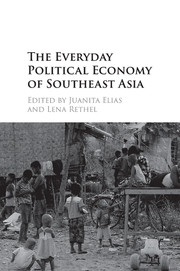Book contents
- Frontmatter
- Epigraph
- Contents
- List of Figures and Map
- List of Tables
- Notes on Contributors
- Acknowledgements
- Part I Introduction
- Part II From Development to Multiple Modernities
- Part III Widening and Deepening Markets
- Part IV People, Mobilities and Work
- 8 From Formal Employment to Street Vending: Malaysian Women's Labour Force Participation over the Life Course
- 9 Everyday Identities in Motion: Situating Malaysians within the ‘War for Talent’
- 10 Regional Disputes over the Transnationalization of Domestic Labour: Malaysia's ‘Maid Shortage’ and Foreign Relations with Indonesia and Cambodia
- 11 Enforcing Socioeconomic Rights: Everyday Agency, Resistance and Community Resources among Indonesian Migrant Domestic Workers in Hong Kong
- Part V Conclusion
- Index
- References
10 - Regional Disputes over the Transnationalization of Domestic Labour: Malaysia's ‘Maid Shortage’ and Foreign Relations with Indonesia and Cambodia
from Part IV - People, Mobilities and Work
Published online by Cambridge University Press: 05 August 2016
- Frontmatter
- Epigraph
- Contents
- List of Figures and Map
- List of Tables
- Notes on Contributors
- Acknowledgements
- Part I Introduction
- Part II From Development to Multiple Modernities
- Part III Widening and Deepening Markets
- Part IV People, Mobilities and Work
- 8 From Formal Employment to Street Vending: Malaysian Women's Labour Force Participation over the Life Course
- 9 Everyday Identities in Motion: Situating Malaysians within the ‘War for Talent’
- 10 Regional Disputes over the Transnationalization of Domestic Labour: Malaysia's ‘Maid Shortage’ and Foreign Relations with Indonesia and Cambodia
- 11 Enforcing Socioeconomic Rights: Everyday Agency, Resistance and Community Resources among Indonesian Migrant Domestic Workers in Hong Kong
- Part V Conclusion
- Index
- References
Summary
Introduction
Employing domestic workers from a variety of less developed countries in Asia has, in recent years, become widespread practice among middle-class Malaysian households. This normalization of domestic employment reflects both the unwillingness of the state to take on some of the social reproductive burdens needed to support increases in women's labour force participation, as well as the symbolic value that employment of a domestic worker plays in cultural perceptions of middle-class status. Indonesian women, in particular, have tended to dominate paid domestic work. This dependency of the Malaysian middle classes on low-paid Indonesian domestic workers was, however, thrown into flux in June 2009 when Indonesia placed an embargo on formalized flows of domestic workers into Malaysia. The actions of the Indonesian government were a reaction to ongoing cases of abuse against Indonesian migrants and, specifically, the death of an Indonesian domestic worker at the hands of her employer. Subsequently, the Indonesian government sought to engage in bargaining strategies with Malaysia in order to leverage better working conditions for its citizens. As negotiations with Indonesia appeared to falter, alternative sources of cheap domestic work were sought out. In particular, private recruitment brokers in Cambodia sought to bring in large numbers of women to be employed as domestic workers in Malaysia. Prior to the Indonesian ban on domestic workers, the trend of Cambodian women migrating to Malaysia for work was only just beginning to be registered (the more established pattern of female migration was from Cambodia to Thailand). The withdrawal of Indonesian domestic labour resulted in marked increases in the number of Cambodian women arriving in Malaysia (Kuppusamy 2012). However, a series of high-profile media reports of abuse and exploitation both in Malaysia by employers and in Cambodia by recruitment agencies called into question the regulatory measures supposedly in place to protect workers (Holliday 2012). In October 2011 a complete ban on the sending of Cambodian women as domestic workers to Malaysia was announced (LICADHO 2011).
We explore the contours of these disputes between Malaysia, Indonesia and Cambodia. On face value, the disputes can be seen as manifestations of regulatory failures: failures to manage migration flows appropriately; failures to protect workers from abuses; and failures to agree basic terms and conditions of domestic worker employment.
- Type
- Chapter
- Information
- The Everyday Political Economy of Southeast Asia , pp. 196 - 217Publisher: Cambridge University PressPrint publication year: 2016
References
- 1
- Cited by



